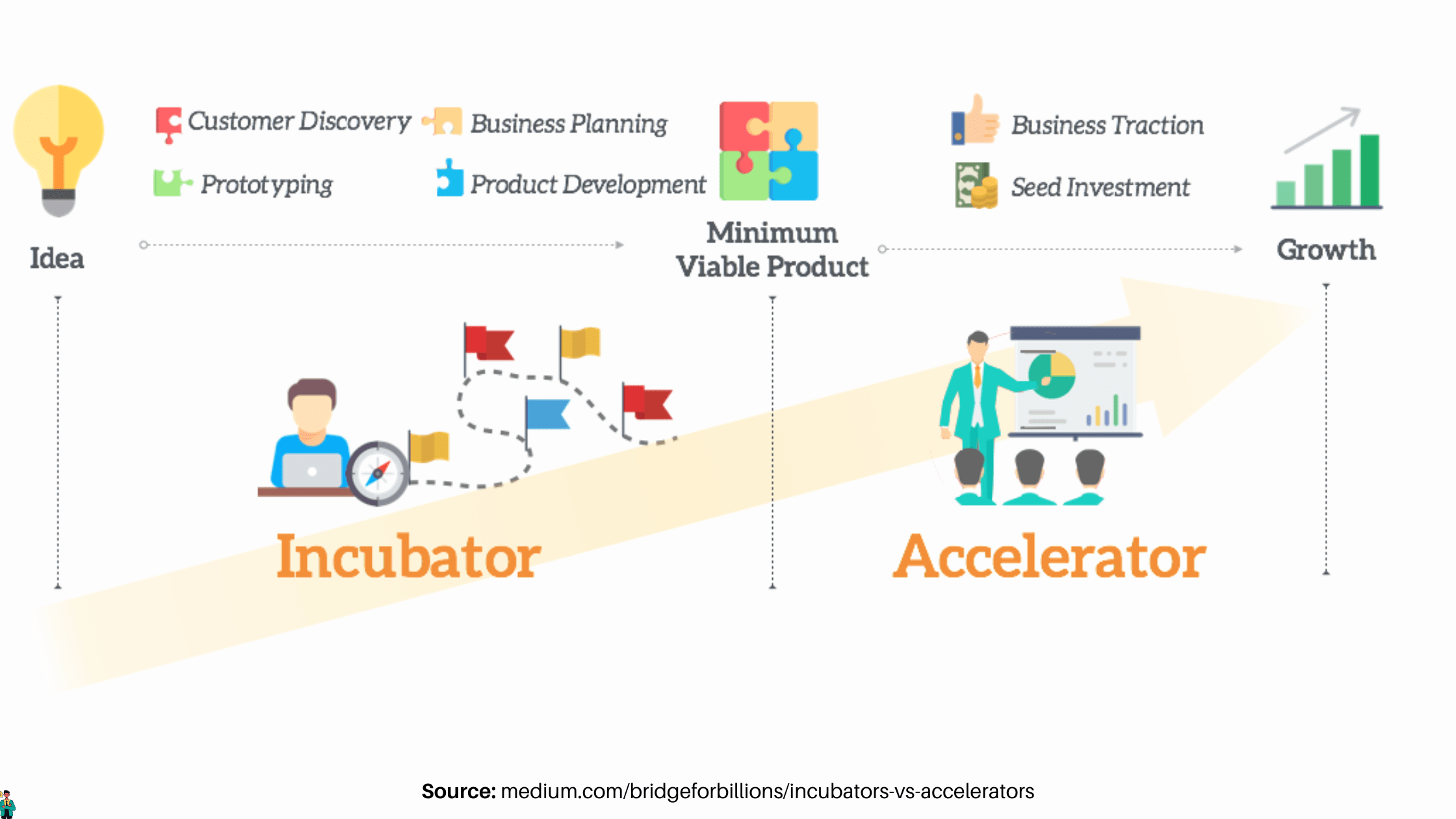My college had a startup incubator and I thought it was useless. That was before I ventured into business and read about startups. Starting a business, especially as a student or recent graduate, is exciting but challenging. That’s where startup incubators come in.
These special programs help new businesses grow by providing resources, mentorship, and networking opportunities. Whether you’re just starting out or looking to take your idea to the next level, a startup incubator can be a game-changer.
In this article, we’ll talk about what startup incubators are, the different types available, and how they can benefit you. We’ll also cover how to choose the right incubator and share some success stories. By the end, you’ll understand why startup incubators are important and how they can help your startup succeed.
What is a Startup Incubator?
By definition, a startup incubator is a program designed to help new businesses grow and succeed. It offers resources like office space, mentorship, and funding. Think of it as a support system for startups, guiding them through the early stages of development.
Role of Incubators in Startup Development
Incubators play a crucial role in helping startups. They provide a safe environment where you can test your ideas and develop your business model. Incubators offer access to experienced mentors who can give valuable advice and guidance. They also connect you with investors and other startups, creating a network that supports your growth.
Joining an incubator can significantly increase your chances of success. You get access to resources that might otherwise be out of reach. The support from an incubator helps you navigate challenges and avoid common pitfalls, making your startup journey smoother and more manageable.
By joining a startup incubator, you gain essential resources and become part of a community focused on innovation and growth. This collaborative environment fosters creativity and helps you stay motivated.
Types of Startup Incubators
Startup incubators come in various forms, each catering to different needs and stages of startups. If you plan to build your startup and get help from incubators, you must know the types:
1. Corporate Incubators
Corporate incubators are initiated and funded by established companies. These incubators offer startups resources such as funding, mentorship, and access to industry networks.
Advantages:
- Access to Industry Expertise: Being backed by established corporations means your startup can tap into valuable industry knowledge.
- Financial Support: Corporate incubators often provide funding or access to investment opportunities.
- Networking Opportunities: These incubators help you connect with potential clients, partners, and investors.
Example: Imagine a tech giant like Google running an incubator focused on nurturing tech startups. Startups in this program would benefit from Google’s expertise, technology, and market insights.
2. University-based Incubators
University-based incubators are affiliated with academic institutions. I had one in my college, you must have one in yours too. These incubators provide college startups with resources like workspace, mentorship, and access to university resources such as research facilities.
Advantages:
- Access to Academic Resources: Your startup can leverage university resources like labs, research facilities, and intellectual property.
- Educational Support: Universities often offer workshops, seminars, and training programs to help startups develop key skills.
- Networking with Peers: Your startup can collaborate with other innovative ventures within the university ecosystem.
Example: My university had an incubator that focused on supporting tech startups. Startups in this incubator benefit from access to cutting-edge research and mentorship from faculty members.
3. Accelerators (vs. Incubators)

While both accelerators and incubators support startups, they differ in their focus and approach.
- Incubators: Typically provide long-term support and resources to help startups develop their ideas into viable businesses. Incubators focus on early-stage startups and offer a wide range of resources, including mentorship, funding, and workspace.
- Accelerators: Offer short-term, intensive programs designed to accelerate the growth of startups. Accelerators usually work with startups that already have a product or service and focus on scaling their business rapidly.
Choosing Between Them: The choice between an accelerator and an incubator depends on the startup’s stage of development, goals, and needs. Early-stage startups may benefit more from an incubator, while those ready to scale quickly might opt for an accelerator program.
Pros and Cons of Startup Incubators
If you are considering joining a startup incubator, this section will help. It’s common sense to analyze the pros and cons of anything you get into. So, let’s analyze the pros and cons of startup incubators:
Advantages of Joining a Startup Incubator
As a college student or recent graduate venturing into the startup world, the benefits of startup incubators can be immense:
- Access to Expert Mentorship: Startup incubators offer invaluable mentorship that can significantly enhance your business acumen and decision-making skills.
- Networking Opportunities: One of the key advantages of joining an incubator is the opportunity to network with fellow entrepreneurs, potential investors, and industry influencers.
- Access to Funding: Many startup incubators provide access to funding opportunities, whether through direct investment or connections to angel investors and venture capitalists.
- Validation and Credibility: Being part of a reputable startup incubator lends credibility to your venture. It validates your business idea and increases trust among potential customers, partners, and investors.
- Shared Resources and Infrastructure: From office space to technology resources, incubators often provide startups with access to shared facilities, reducing operational costs and improving efficiency.
Challenges and Limitations of Startup Incubation Programs
There isn’t any disadvantage of startup incubators, but rather some challenges and limitations you might face:
- Competitive Selection Process: Getting accepted into a startup incubator can be highly competitive. You’ll need a good business idea, a solid execution plan, and the ability to stand out among other applicants.
- Equity Stake: Some incubators require startups to give up equity in exchange for their services and support. While this can be beneficial in terms of access to resources, it’s crucial to weigh the long-term implications of equity dilution.
- Time Commitment: Participating in a startup incubation program requires a significant time commitment. Balancing the demands of the program with other responsibilities can be challenging, especially for students or part-time entrepreneurs.
- Limited Control: Joining an incubator means sharing decision-making authority with mentors and advisors. While their expertise can be valuable, it may also limit your autonomy in certain aspects of your startup’s development.
- Graduation and Transition: At the end of the incubation period, startups often face the challenge of transitioning out of the program and sustaining their growth independently.
In short, if you aim to build a bootstrapped startup, startup incubators aren’t for you.
How Startup Incubators Work
Now that you know what is a startup incubator, it’s role in building startups, pros and cons, it’s time you understand the workflow.
Understanding how startup incubators work is crucial for any entrepreneur (you) considering this path. Here’s a breakdown of the process:

1. Application and Selection Process
The journey begins with an application.
- Application Submission: Startups submit an application that includes their business idea, market research, business plan, and details about the founding team.
- Initial Screening: Incubators conduct an initial screening to filter out applications that do not meet their criteria. They look for innovative ideas with strong market potential and dedicated teams.
- Pitch Presentation: Shortlisted startups are invited to pitch their ideas. This involves a formal presentation followed by a Q&A session with the incubator’s selection panel.
- Evaluation: The selection panel evaluates the pitches based on several criteria, including innovation, market potential, team capability, and scalability.
- Final Selection: Successful startups are notified and invited to join the incubation program
2. Incubation Programs
Once selected, startups enter the incubation program. This phase includes several key components:
- Onboarding: Startups undergo an onboarding process to familiarize themselves with the incubator’s resources, mentors, and facilities. They set clear goals and milestones for the incubation period.
- Mentorship: Each startup is paired with mentors who are experts in their industry. Regular mentoring sessions are scheduled to provide guidance on strategy, product development, and market entry.
- Workshops and Training: Incubators offer workshops and training sessions on various topics, such as fundraising, marketing, sales, and legal aspects. These sessions are designed to build essential skills.
- Resource Allocation: Startups gain access to resources like office space, technical equipment, and software tools. This support helps them focus on building their product without worrying about operational logistics.
- Networking Events: Incubators organize networking events, including meetups, demo days, and investor pitch events. These events provide opportunities to connect with potential investors, customers, and partners.
3. Duration and Stages of Incubation
Incubation programs usually last from a few months to a couple of years. The process is divided into stages:
- Initial Stage: Focus on refining the business idea, building a minimum viable product (MVP), and validating the market.
- Development Stage: Work on scaling the product, improving the business model, and starting to build a customer base.
- Final Stage: Prepare for graduation, which includes scaling operations, seeking further funding, and establishing sustainable revenue streams.
4. Exit Strategy
Graduating from an incubator involves preparing for life after incubation:
- Funding Rounds: Incubators help startups secure funding from investors through pitch events and introductions. Startups should aim to raise sufficient capital to support their next growth phase.
- Market Launch: Startups may officially launch their product or service to the broader market, leveraging the incubator’s network for media coverage and customer acquisition.
- Continued Support: Many incubators offer alumni support, including ongoing mentorship, access to resources, and networking opportunities. This continued relationship can be crucial for long-term success.
Choosing the Right Startup Incubator for Your Business
If you’re trying to build a startup and want guidance from a startup incubator, I hope this article helps you clear your doubts. I have done my part, and now it’s your turn to select the right incubator for your business.
Start by assessing your needs: determine your startup’s stage, required resources, and industry focus. Research potential incubators through online platforms, events, and recommendations from your network. Evaluate each incubator’s program offerings, mentor network, track record, location, and cultural fit.
Once you find a fit, tailor your application to align with the incubator’s focus, perfect your pitch, and prepare all supporting materials. Once you get in, build that business!
FAQs
1. What is the main difference between a startup incubator and an accelerator?
Startup incubators provide long-term support to develop business ideas into viable companies, while accelerators offer short-term, intensive programs to rapidly scale existing businesses.
2. How can I increase my chances of getting accepted into a startup incubator?
Ensure your application is thorough, highlight your innovative idea and market potential, perfect your pitch, and seek recommendations from your network.
3. Do all startup incubators take equity in exchange for their services?
Not all incubators take equity; some operate on a fee-based model or provide grants. It’s essential to understand the terms before applying.
4. What types of resources do startup incubators typically offer?
Incubators offer office space, mentorship, funding opportunities, technical support, and networking events, along with workshops on various business aspects.
5. How long do startups usually stay in an incubator program?
Incubation programs typically last from a few months to a couple of years, focusing on developing and scaling the business idea in stages.











Leave feedback about this